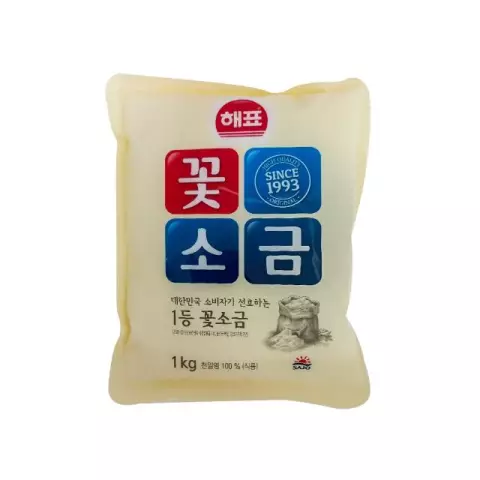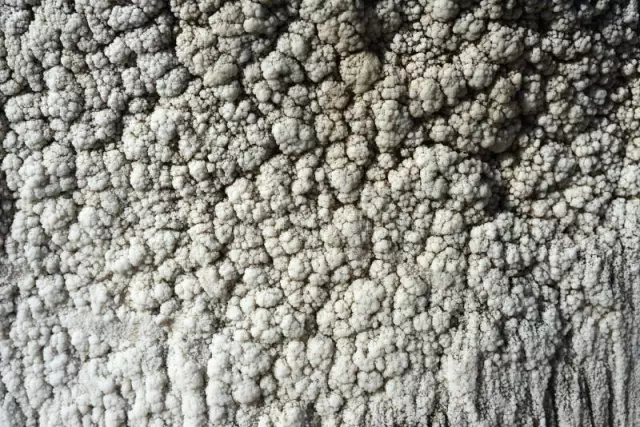- Author Rachel Wainwright wainwright@abchealthonline.com.
- Public 2023-12-15 07:39.
- Last modified 2025-11-02 20:14.
Benzylpenicillin novocaine salt
Benzylpenicillin novocaine salt: instructions for use and reviews
- 1. Release form and composition
- 2. Pharmacological properties
- 3. Indications for use
- 4. Contraindications
- 5. Method of application and dosage
- 6. Side effects
- 7. Overdose
- 8. Special instructions
- 9. Application during pregnancy and lactation
- 10. In case of impaired renal function
- 11. Drug interactions
- 12. Analogs
- 13. Terms and conditions of storage
- 14. Terms of dispensing from pharmacies
- 15. Reviews
- 16. Price in pharmacies
Latin name: Benzylpenicillin novocaine
ATX code: J01CE09
Active ingredient: procaine benzylpenicillin (Procaine Benzylpenicillin)
Producer: Sintez, JSC (Russia)
Description and photo updated: 30.11.2018

Benzylpenicillin novocaine salt is a parenteral antibiotic from the group of biosynthetic penicillins.
Release form and composition
Dosage form - powder for preparation of a suspension for intramuscular administration: white (in a cardboard box of 1, 5, 10 or 50 bottles and instructions for the use of Benzylpenicillin novocaine salt).
The active substance in the composition of 1 bottle: benzylpenicillin novocaine salt in the form of benzylpenicillin procaine - 600 thousand units (units of action).
Pharmacological properties
Pharmacodynamics
Benzylpenicillin novocaine salt is one of the bactericidal antibiotics from the group of natural (biosynthetic) penicillins. Its action is based on suppressing the synthesis of the cell wall of microorganisms.
Shows activity:
- gram-positive pathogens: staphylococci (not forming a penicillinase), streptococci, pneumococci, diphtheria corynebacterium, anaerobic spore-forming bacilli, anthrax sticks, Actinomyces spp.;
- gram-negative microorganisms: Neisseria meningitidis, Neisseria gonorrhoeae, Treponema spp., gonococci, meningococci, spirochetes.
In relation to the majority of gram-negative bacteria, viruses, rickettsia, protozoa Benzylpenicillin, novocaine salt is inactive.
Penicillinase-forming strains of microorganisms are resistant to the drug.
The substance is destroyed in an acidic environment. In comparison with sodium and potassium salts, the procaine salt of benzylpenicillin is characterized by a long duration of action.
Pharmacokinetics
With the intramuscular injection of benzylpenicillin novocaine salt, the maximum concentration of the substance is achieved in 20-30 minutes.
The half-life is 30-60 minutes, in patients with renal insufficiency, the value of the indicator increases to 4-10 hours or more.
The substance binds to plasma proteins at a level of 60%. Penetrates into biological fluids, tissues and organs, with the exception of prostate and eye tissues, as well as cerebrospinal fluid. It penetrates the blood-brain barrier in case of inflammation of the meningeal membranes.
Benzylpenicillin procaine is excreted unchanged by the kidneys.
Indications for use
Benzylpenicillin novocaine salt is prescribed for the treatment of the following bacterial infections caused by pathogens sensitive to the drug:
- sepsis, peritonitis, septic endocarditis in acute and subacute course;
- empyema of the pleura, pneumonia (croupous, focal), bronchitis;
- secondarily infected dermatoses, erysipelas, impetigo (infections of the skin and soft tissues);
- osteomyelitis;
- meningitis;
- cholecystitis, cholangitis (biliary tract infections);
- pyelitis, urethritis, gonorrhea, syphilis, blennorrhea, pyelonephritis, cystitis, cervicitis (infections of the genitourinary system);
- actinomycosis;
- wound infections;
- diphtheria;
- anthrax;
- scarlet fever;
- diseases of the ENT organs;
- diseases of the organ of vision.
Contraindications
Absolute:
- allergy to procaine;
- individual intolerance to the components of the drug and antibiotics of the penicillin group.
Relative (Benzylpenicillin novocaine salt is prescribed under medical supervision):
- bronchial asthma;
- hay fever and other diseases of allergic etiology;
- decrease in blood clotting activity;
- renal failure;
- pregnancy and lactation.
Benzylpenicillin novocaine salt, instructions for use: method and dosage
Benzylpenicillin novocaine salt is intended for intramuscular injection (deep into the muscle), it is prohibited to inject the drug intravenously and endolumbar.
Recommended dosage regimen:
- children under 1 year old: from 50 to 100 thousand units / kg per day;
- children from 1 year old: 50 thousand units / kg per day;
- adults: one-time - 300 thousand units, daily - 600 thousand units, maximum daily - 1200 thousand units.
Frequency rate of application - 1-2 times a day.
The drug is prescribed in a course that is determined by the form and severity of the course of the disease, on average - from 7-10 days to 2 months or longer (in the treatment of septic endocarditis, sepsis).
The solution is prepared ex tempore (as needed, that is, individually according to the doctor's prescription). For preparation, water for injection or 0.9% sodium chloride solution for injection is used at the rate of 3 ml per 1 bottle of powder. The contents of the vial should be shaken vigorously until a suspension is formed, which must be quickly drawn into a syringe and injected into the muscle.
Side effects
Possible violations:
- local reactions: induration and soreness at the injection site;
- allergic reactions: rash on mucous membranes, hyperthermia, skin rash, urticaria, eosinophilia, arthralgia, interstitial nephritis, angioedema, bronchospasm; in rare cases - anaphylactic shock.
When the drug enters the vascular bed, disturbances in the form of dizziness, tinnitus, short-term loss of consciousness, visual impairment, and fear may occur.
Against the background of the use of very large doses of benzylpenicillin novocaine salt, the manifestation of such side reactions as increased reflex excitability, vomiting, nausea, convulsions, symptoms of meningism, coma is possible.
Overdose
- main symptoms: impaired consciousness, convulsions;
- therapy: symptomatic, drug withdrawal.
special instructions
Evaluation of the effectiveness of the drug is carried out after 2-3, maximum - 5 days. If the condition does not improve, a change in the treatment regimen is indicated (transfer of the patient to another antibiotic or a combination of antibacterial drugs).
With prolonged use of benzylpenicillin, in order to avoid the development of fungal infections, it is advisable to simultaneously prescribe vitamins C and group B, if necessary, levorin and nystatin are used.
It should be borne in mind that the use of benzylpenicillin novocaine salt in insufficient doses or too short a course can lead to the emergence of resistant strains of pathogens.
Endolumbar and intravenous administration can cause the development of Wanier's syndrome, manifested by the appearance of feelings of anxiety, depression, visual impairment and paresthesias.
If any allergic reactions develop, immediate discontinuation of the drug should be considered.
In the treatment of sexually transmitted diseases, patients with suspected syphilis require serological and microscopic studies before starting therapy and then for 4 months.
Application during pregnancy and lactation
Pregnancy and lactation are relative contraindications to the use of benzylpenicillin novocaine salt, before starting therapy, the doctor must assess the balance of benefits and possible harm.
With impaired renal function
Benzylpenicillin novocaine salt is prescribed with caution to patients with renal insufficiency.
Drug interactions
Interaction of benzylpenicillin novocaine salt with other antibiotics:
- vancomycin, cephalosporins, rifampicin, aminoglycosides (bactericidal): synergistic action;
- lincosamides, tetracyclines, macrolides, chloramphenicol (bacteriostatic): antagonistic action.
The effect of the drug on the effectiveness of jointly used drugs:
- indirect anticoagulants: increase due to suppression of intestinal microflora, which leads to a decrease in the prothrombin index;
- oral contraceptives, drugs, in the process of metabolism of which the formation of para-aminobenzoic acid, ethinyl estradiol occurs: a decrease against the background of an increased risk of breakthrough bleeding.
The concentration of benzylpenicillin increases with simultaneous use with diuretics, allopurinol, tubular secretion blockers, phenylbutazone, non-steroidal anti-inflammatory drugs (associated with a decrease in tubular secretion).
When combined therapy with allopurinol, the likelihood of allergic reactions (skin rash) increases.
Analogs
The analogues of Benzylpenicillin novocaine salt are Penicillin G sodium salt, Benzylpenicillin, Benzylpenicillin sodium salt, Benzylpenicillin sodium salt crystalline, Procaine-Benzylpenicillin, Procaine penicillin G 3 mega.
Terms and conditions of storage
Store in a place protected from moisture at temperatures up to 25 ° C. Keep out of the reach of children.
The shelf life is 5 years.
Terms of dispensing from pharmacies
Dispensed by prescription.
Reviews about Benzylpenicillin novocaine salt
Reviews of Benzylpenicillin novocaine salt are extremely rare, since the drug is most often used as part of complex therapy in a hospital setting. It is practically absent from the pharmacy chain.
The price of Benzylpenicillin novocaine salt in pharmacies
The approximate price of benzylpenicillin novocaine salt powder for the preparation of a suspension for intramuscular administration in 1 bottle of 600 thousand units is 4 rubles for 1 bottle, 43 rubles for 10 bottles.

Anna Kozlova Medical journalist About the author
Education: Rostov State Medical University, specialty "General Medicine".
Information about the drug is generalized, provided for informational purposes only and does not replace the official instructions. Self-medication is hazardous to health!






